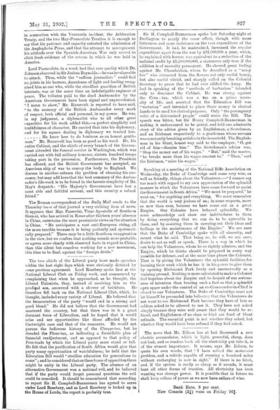The two chiefs of the Liberal party have made speeches
within the last eight days which were obviously dictated by some previous agreement. Lord Rosebery spoke first at the National Liberal Club on Friday week, and commenced by complaining that when he approached, as he thought, the Liberal Unionists, they, instead of receiving him as the prodigal son, answered with a shower of brickbats. He therefore fell back on the National Liberal Club, which, be thought, included every variety of Liberal. He believed that the fermentation of the party "would end in a strong and good blend." He did not believe that the Government had mastered the country, but that there was in it a great dormant force of Liberalism, and be hoped that it would arise and use opportunities like those afforded by the Cartwright case and that of the remounts. He would not pursue the ludicrous history of the Cheque-tax, but he dreaded the Flour-tax, as indicating a formidable plan of financial readjustment, and as opposed to that policy of Free-trade by which the Liberal party must stand or fall. He felt that the pacification of South Africa would give that party many opportunities of watchfulness; he held that the Education Bill would "sterilise education for generations to come" ; and he considered thaton these bases of opposition there might be unity in the Liberal party. The absence of an alternative Government was a national evil, and he believed that if the party would forget personal questions the evil could be remedied. It should be remembered that according to report Sir H. Campbell-Bannerman has agreed to serve under Lord Rosebery, and as Lord Rosebery is locked up in the House of Lords, the report is probably true.










































 Previous page
Previous page